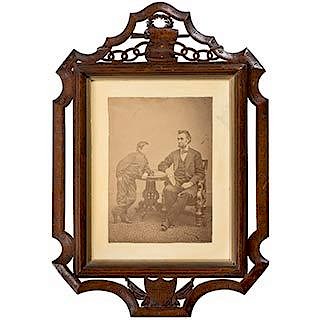Slavery & "The Kansas Question," The Register, Monroe, LA, May 10, 1860
About Seller
6270 Este Ave.
Cincinnati , OH 45232
United States
With offices in Cincinnati, Cleveland and Denver, Cowan’s holds over 40 auctions each year, with annual sales exceeding $16M. We reach buyers around the globe, and take pride in our reputation for integrity, customer service and great results. A full-service house, Cowan’s Auctions specializes in Am...Read more
Two ways to bid:
- Leave a max absentee bid and the platform will bid on your behalf up to your maximum bid during the live auction.
- Bid live during the auction and your bids will be submitted real-time to the auctioneer.
Bid Increments
| Price | Bid Increment |
|---|---|
| $0 | $25 |
| $500 | $50 |
| $1,000 | $100 |
| $2,000 | $250 |
| $5,000 | $500 |
| $10,000 | $1,000 |
| $20,000 | $2,500 |
| $50,000 | $5,000 |
| $100,000 | $10,000 |
About Auction
Sep 8, 2017 - Sep 9, 2017
Cowan's Auctions dawnie@cowans.com
- Lot Description
The Register. Official Paper of the Parish of Ouachita. Monroe, LA: May 10, 1860. Vol. X, No. 24. 4pp, 17.5 x 23 in.
The front page is primarily concerned with the Democratic National Convention at Charleston, and continues on the second page. With headlines "The Convention Disorganized! Eight States Seceded!!" The delegates from Georgia, Alabama, Mississippi, Louisiana, Arkansas, Texas, and Florida met in a caucus before the convention convened, and pledged to stop the nomination of Stephen Douglas, who had advanced the "popular sovereignty" doctrine in 1854, allowing each territory to decide whether to allow slavery, but by 1858 was supporting the "Freeport Doctrine," which rejected the Supreme Court's Dred Scott decision, which protected slavery in all territories. This angered many of the more radical Southern representatives, who pledged to stop the nomination of Douglas, which appeared certain before the convention.
Protection of slavery was written into the Democratic platform, which Northern representatives rejected. The Southern representatives from six of the seven states in the caucus, plus South Carolina, and three of the four Arkansas delegates and one of the Delaware delegates walked out, met at St. Andrews Hall and declared themselves a convention. When the original convention did not invite them to return, they nominated their own candidates. The original convention could not get a quorum without the "renegades," and broke up in confusion after 57 ballots.
A month later, the party convened again in Baltimore, and re-admitted all delegates except those from Louisiana and Alabama. It selected new delegates from those states (many criticized these as being selected because they were pro-Douglas). After two ballots, by unanimous voice vote, Douglas was selected as the candidate.
The Southern Democrats who left the original convention met at the Maryland Institute in Baltimore, adopted a pro-slavery platform, and nominated John C. Breckinridge (one ballot). This split in the Democratic Party insured the victory of the Republicans in 1860.
Small note in Col. 3 just below the fold: New Orleans, May 3 - A meeting will be held to-morrow evening at Lafayette Square to protest against any action on the part of the citizens of Louisiana, which would commit the State to disunion, and also against secession.
There is a call on the second page for delegates to be elected from every county in Alabama, to meet at Baltimore in June. Interestingly, in the last column on the first page, they report on two pieces of legislation in the U.S. Congress which would greatly benefit Louisiana, one having to do with allowing the state to impose tonnage duties, with the funds being used to dredge the river to keep it open. The other has to do with settling land disputes that had been lingering for centuries in some cases, resulting from Louisiana being Spanish, French, then American. It is a bit of a back-handed endorsement, however. "The injustice, injury, and oppression that have marked the course of our Federal Government in the settlement of old land titles in this State, would have driven almost any other people to open rebellion and revolution.... That parties who held titles under the old Spanish and French Governments, whose faith was guaranteed by the United States, in the Treaty of Cession - which titles would have been perfectly good under the old government - should be deprived of the same, and the land so held be appropriated by the United States to its own use...." It sounded like "rebellion" was still a possibility, and, of course, they did the following January.
Condition
Some damp stains and folds as well as a tear at the top center margin of the page near the title and towards the bottom right center margin.
Item is in good condition.
Eliminate the Hassle of Third-Party Shippers: Let Cowan's Ship Directly To You! If you'd like a shipping estimate before the auction, contact Cowan's in-house shipping department at shipping@cowans.com or 513.871.1670 x391 - Shipping Info
-
SHIPPING. At the request of the buyer, Cowan's will authorize the shipment of purchased items. Shipments usually occur within two weeks after payment has been received. Shipment is generally made via UPS Ground service. Unless buyer gives special instructions, the shipping method shall be at the sole discretion of Cowan's Auctions, Inc.. Cowan's is in no way responsible for the acts or omissions of independent handlers, packers or shippers of purchased items or for any loss, damage or delay from the packing or shipping of any property.
Eliminate the Hassle of Third-Party Shippers: Let Cowan's Ship Directly To You!If you'd like a shipping estimate before the auction, contact Cowan's in-house shipping department at shipping@cowans.com or 513.871.1670 x219
-
- Buyer's Premium



 EUR
EUR CAD
CAD AUD
AUD GBP
GBP MXN
MXN HKD
HKD CNY
CNY MYR
MYR SEK
SEK SGD
SGD CHF
CHF THB
THB













